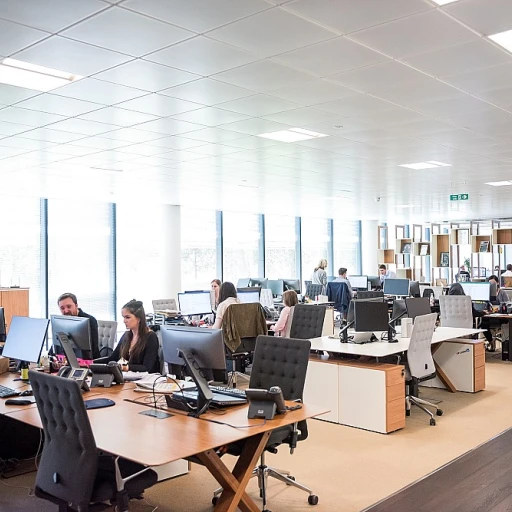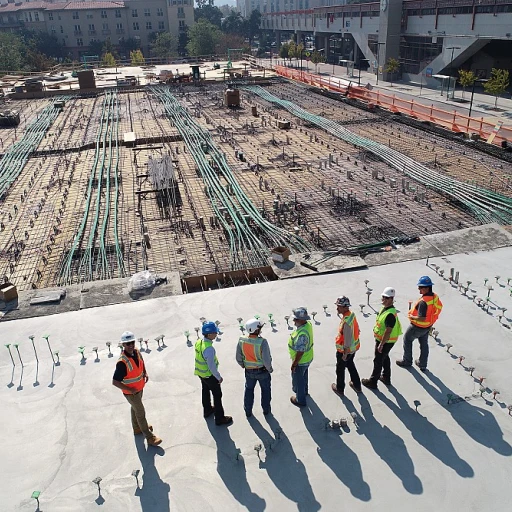
Understanding the Role of Debrief Meetings in Change Management
Decoding the Essence of Debrief Meetings in Change Management
In the realm of change management, debrief meetings serve as a linchpin for guiding teams through the complexities of transition. These meetings are not just routine gatherings; they are strategic opportunities to reflect on the progress of a project event, evaluate outcomes, and chart a path forward. One vital aspect of a debrief meeting is its ability to provide key insights into what transpired during an event. Team members convene to deliberate on the meeting agenda, discussing successes, areas for improvement, and lessons learned. By systematically examining these factors, a team can identify areas to refine and optimize future events. A successful debrief meeting is structured around a set of essential components. Typical elements include a guiding debrief template and targeted debrief questions that focus on key takeaways from the project or event. Such a template helps focus the discussion, ensuring that all attendees can contribute valuable feedback. By categorizing insights into "what went well," "what can be better," and "action items for the future," teams can create a roadmap for continuous improvement. Furthermore, these meetings foster a culture of open dialogue and collective learning among team members. During the post-event debrief, feedback from all attendees is encouraged, helping to build trust and transparency within the team. It is through these dynamic discussions that teams can unlock the potential for better decision-making and strategic planning. As workplace dynamics evolve, the role of debrief meetings will evolve too. Integrating innovative facilitation techniques and digital tools may offer new ways to enhance participation and streamline the debrief process. Understanding these shifts will help organizations stay ahead in change management, making debrief meetings an indispensable tool for future success.Key Elements of a Successful Debrief Meeting
Core Components for Effective Debrief Sessions
In mastering the art of effective debrief meetings, key elements must be meticulously incorporated to ensure each session is productive and valuable for all team members. By focusing on these components, teams can better facilitate insights and target areas for improvement in their change management processes.- Clear Agenda: Establishing a structured meeting agenda before the debrief is crucial. It helps guide the discussion, ensuring no key points are overlooked, and keeps the session on track, respecting the scheduled time.
- Open and Honest Feedback: Encourage a transparent environment where attendees feel comfortable sharing their experiences. This builds trust among team members and provides meaningful insights from the debrief.
- Focused Debrief Questions: Develop specific debrief questions that direct the conversation towards identifying lessons learned and key takeaways from the project or event. Questions should address what went well, what could be better, and how to improve future events.
- Action Items: Conclude with a set of action items derived from the session. Clear, actionable steps will help in implementing change and addressing any highlighted areas for improvement.
- Inclusive Participation: Ensure all team members have an opportunity to contribute. This diverse input can surface unique perspectives and foster a collaborative environment.
Strategies for Facilitating Productive Debrief Sessions
Effective Techniques to Facilitate Engaging Debrief Sessions
In leveraging the power of well-structured debrief meetings, facilitators play a crucial role in ensuring they are productive and meaningful for all involved. As debrief sessions become an integral part of change management, having strategies to encourage open dialogue and reflective thinking among team members is essential.Setting the Proper Environment
Creating an environment conducive to participation is one of the key aspects of a successful debrief meeting. Facilitators should ensure the meeting space, whether physical or virtual, promotes comfort and openness. This will help attendees feel at ease to share their honest insights and feedback about the project or event.Establishing a Clear Agenda
A well-defined meeting agenda will help guide discussions and keep the meeting on track. Setting a structure with critical time allocations for each topic allows team members to prepare and understand the focus areas. A template for such an agenda might include time for:- Reviewing objectives and key outcomes
- Discussing lessons learned
- Identifying areas for improvement
- Planning action items for future events
Encouraging Open Dialogues
Facilitators should invite continuous feedback and ensure all voices are heard. Asking open-ended debrief questions can spark thoughtful discussion and uncover valuable insights. These questions can include, "What went well during the project?" or "What challenges did we face, and how might we address similar issues in the future?"Utilizing a Debrief Template
Implementing a consistent debrief template allows team members to track discussions effectively. Templates can provide a reference for areas that require improvement and serve as a post-event checklist for action items.Promoting Continuous Improvement
Encouraging team members to focus on key takeaways and insights will lead to better strategies for upcoming projects. By identifying areas needing enhancement, the team can proactively plan for successful events and adapt to the evolving workplace environment. For more insights on evaluating and mastering change management strategies, read more on evaluating change management for success. A successful debrief meeting sets the stage for future achievements by learning from past experiences. Employing these strategies will help enhance the quality of your debrief sessions, ensuring they remain effective and action-oriented.Common Challenges in Debrief Meetings and How to Overcome Them
Overcoming Common Challenges in Debrief Meetings
Debrief meetings play a crucial role in the iterative process of change management by offering a structured setting to assess the successes and failures of a project event. However, these meetings can sometimes fall short of their potential when challenges arise, affecting the overall effectiveness. Recognizing these common hurdles and knowing how to address them can significantly optimize your meetings.
Ensuring a Focused Agenda
The absence of a well-structured meeting agenda is a frequent issue that can lead to disorganized discussions and unproductive sessions. Establishing a clear agenda, complete with debrief questions and key topics, ensures everyone is aligned with the meeting's objectives. This agenda will help keep team members on track and facilitate meaningful discussions on lessons learned and areas for improvement.
Balancing Constructive Feedback
Feedback is essential in debrief meetings, yet it can sometimes be too critical or not specific enough. It's essential to foster an environment of open communication, where feedback is viewed as an opportunity for improvement rather than criticism. Encourage attendees to focus on identifying areas for enhancement in a constructive manner, promoting a future-focused mindset.
Time Management and Participation
Managing the time allocated for debrief meetings is a common challenge. To maximize the time, a debrief template can be used to outline the necessary topics, ensuring each segment receives attention proportionate to its importance. Another aspect of time management is engaging all team members in the discussion. Promoting active participation will provide diverse insights and help uncover key takeaways across different perspectives.
Handling Resistance to Change
Resistance can arise when team members are hesitant to embrace new strategies or action items identified during debrief meetings. Facilitating a culture of acceptance requires an understanding of the root causes of resistance and addressing them directly. Transparency in communications and involving team members in the planning stages of future events can minimize resistance and build a collective commitment to change.
By identifying these challenges and introducing targeted strategies, you can enhance the effectiveness of your debrief meetings, paving the way for better outcomes in future projects and successful events. Remember, continuous improvement in conducting debrief meetings is fundamental to ongoing success in change management.
Case Studies: Successful Debrief Meetings in Change Management
Real-World Examples of Successful Debrief Meetings in Change Management
Exploring real-life scenarios can offer valuable insights into how debrief meetings are instrumental in driving effective change management. These case studies serve as concrete examples of how debrief meetings not only identify areas for improvement but also foster a culture of continuous learning and adaptation within teams.- Technology Project Debrief: In a recent large-scale tech rollout, a company's debrief meeting played a pivotal role in unearthing critical lessons learned. Team members gathered to discuss the event, addressing the initial challenges, and examining feedback from all attendees. Such transparent exchanges helped the organization refine their implementation techniques, improving future projects. Meeting agendas were carefully structured to encourage open dialogue and valuable feedback, which in turn enhanced trust among team members.
- Healthcare Reform Event: A debrief session following a major healthcare policy shift highlighted the importance of structured debrief templates. These provided the team with a systematic way to collect and analyze feedback. The debrief event in this context allowed team members to express insights on patient care implications, enabling the organization to adjust their policies effectively. By continuously revisiting these debrief sessions, the team ensured sustainable improvements over time.
- Corporate Training Program Assessment: After a series of training sessions aimed at improving leadership skills, a dedicated debrief meeting was scheduled to go over key takeaways. This debrief meeting was crucial in identifying areas improvement and action items, which will help in shaping future training agendas. The team utilized a standardized set of debrief questions to guide the conversation, achieving a clearer understanding of what elements added the most value to participants.
The Future of Debrief Meetings in an Evolving Workplace
Adapting Debrief Meetings for Tomorrow's Workplace
As workplaces evolve, so too must the methods we use to evaluate and improve our processes. Debrief meetings, a cornerstone of effective change management, will continue to play a pivotal role in this transformation. The future of debrief meetings lies in their adaptability to new technologies and changing work environments.
Incorporating digital tools can streamline the debrief process. By using a debrief template, teams can ensure consistency and thoroughness in every session. Templates can be customized to include key elements such as debrief questions, meeting agenda, and action items. This structured approach will help identify areas for improvement and capture lessons learned effectively.
With remote work becoming more prevalent, virtual debrief meetings are increasingly common. They offer flexibility in terms of time and location, allowing team members to participate from anywhere. However, they also pose challenges, such as maintaining engagement and ensuring effective communication. Utilizing video conferencing tools with interactive features can enhance team collaboration and ensure all attendees are actively involved in the discussion.
Feedback is crucial in refining the debrief process. Encouraging post-event feedback from all attendees can provide valuable insights into the effectiveness of the meeting and highlight key takeaways. This feedback loop not only improves future debrief meetings but also fosters a culture of continuous improvement within the organization.
Looking ahead, the integration of artificial intelligence and data analytics could revolutionize how we conduct debrief meetings. These technologies can help analyze large volumes of data quickly, providing better insights into project outcomes and identifying patterns that might not be immediately apparent. Such advancements will empower teams to make more informed decisions and drive successful project outcomes.
In conclusion, the future of debrief meetings will be shaped by our ability to adapt to new challenges and leverage technology to enhance our processes. By embracing these changes, organizations can ensure their debrief events remain effective and relevant in an ever-evolving workplace.










